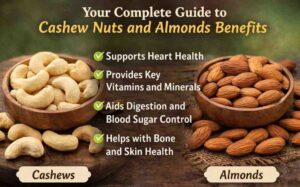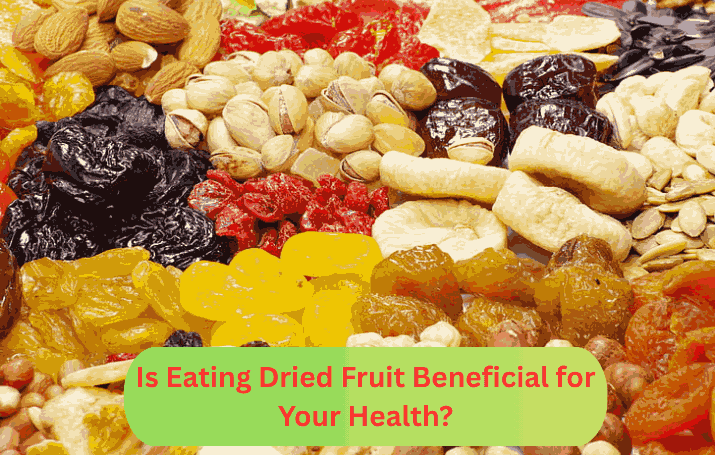
Is Eating Dried Fruit Beneficial for Your Health?

Introduction
People all throughout the world have been eating dried fruits for hundreds of years. You can find these naturally sweet and chewy fruits in a lot of celebratory foods, quick snacks, and even old-fashioned ways to cure. They can be raisins, dates, figs, or apricots. But with more and more people paying attention to their health and nutrition these days, a lot of them are asking: Are dried fruits really good for you?
In this post, we will look at what dried fruits have to offer, how they compare to fresh fruits, and how they can help or hurt your health depending on how you eat them.
What Are Dried Fruits?
Dried fruits are simply fresh fruits that have had most of their water content removed through drying methods like sun drying, air drying, or using specialized machines. The result is a concentrated version of the fruit that is rich in flavour and nutrients but also in calories and sugars.
Common examples include:
- Raisins (dried grapes)
- Dates
- Figs
- Apricots
- Prunes (dried plums)
- Cranberries (often sweetened)
- Dried apples and bananas
Some are sun-dried naturally, while others are dried using industrial processes that may include preservatives like sulphur dioxide to retain colour and extend shelf life.
Nutrient Density: A Powerhouse of Vitamins and Minerals
Dried fruits are nutrient-dense. They retain most of the vitamins, minerals, and fibre found in fresh fruits, but in a more concentrated form. Just a handful can give you a good dose of:
- Iron
- Potassium
- Magnesium
- B-vitamins
- Antioxidants (especially polyphenols)
For instance, dates are rich in potassium and iron, which are essential for heart and blood health. Prunes contain high amounts of vitamin K and fibre, supporting digestion and bone health. Raisins are known to contain antioxidant compounds that help fight cell damage.
Rich in Natural Fibre: A Friend to Your Digestion
Most dried fruits are great providers of dietary fibre, which is very important for good digestion. A modest number of dried figs or prunes can help your digestive system work better, keep you from being constipated, and keep your gut healthy.
Fibre also plays a key role in:
- Slowing down sugar absorption
- Reducing bad cholesterol levels
- Helping you feel fuller for longer (which can help with weight management).
Antioxidants and Anti-inflammatory Compounds
A lot of dried fruits have polyphenols, which are a type of antioxidant that is proven to reduce inflammation and slow down the aging process. These chemicals help keep your cells safe from oxidative stress and inflammation, which are associated to long-term illnesses like cancer, diabetes, and heart disease.
Raisins and dried cranberries are two types of dried fruits that have a lot of these good compounds. They may help brain function and memory over time and are good for the health of all cells.
Energy Boost for Active Lifestyles
Do you want some quick energy before or after you work out? Dried fruits are a great way to get natural sugars and energy that works quickly. For example, athletes like dates and dried bananas because they can quickly refill glycogen stores.
Dried fruits are great for trips, hikes, and long commutes because they are light and don’t go bad fast.
Natural Sweetener for Recipes
Fruits that have been dried out can help you cut down on processed sugar. When you bake with dried figs, you can naturally add sweetness to sweets. You can also blend dates into smoothies or oatmeal. The fact that they are sweet and healthy makes them a good addition to any diet. They’re a healthy addition to any diet!
But balance is very important. It’s easy to eat too many because they have a lot of calories, especially when mixed into trail mixes or granolas.
Are There Any Downsides?
While dried fruits have impressive benefits, there are a few concerns to be aware of:
- High in Sugar and Calories: Removing water concentrates natural sugars. Just one cup of raisins, for example, contains about 430 calories and 86 grams of sugar.
- Possible Additives: Some commercially dried fruits contain added sugars or preservatives like sulphur dioxide, which can trigger allergies or sensitivities in some individuals.
- Dental Concerns: Sticky dried fruits can cling to teeth and promote cavities if not followed by proper oral hygiene.
To enjoy the benefits without the downsides:
- Stick to small portions (a handful is usually enough).
- Choose unsweetened and preservative-free varieties.
Balance them with nuts, seeds, or yogurt to slow sugar absorption.
FAQs About Dried Fruits
Q1: Is dried fruit as healthy as fresh fruit?
Yes and no. Dried fruits retain most of their nutrients but lack water, which makes them more calorie-dense. They are excellent in small amounts but shouldn’t fully replace fresh fruit.
Q2: Can diabetics eat dried fruit?
Yes, in moderation. opt for low-GI options like dried apricots, and always choose unsweetened types. It’s best to consult a nutritionist for personalized advice.
Q3: How much dried fruit should I eat daily?
A small handful (about 30 grams) is a suitable serving size for most people. This provides nutrients without overwhelming your daily sugar intake.
Q4: Are packaged dried fruits safe?
Yes, but always read the label. Avoid added sugars and preservatives. Organic or naturally dried options are safer and healthier.
Q5: Is it okay to eat dried fruit every day?
Absolutely—as long as it fits your calorie needs and you’re mindful of portion sizes.
Conclusion: Small Fruit with a Lot of Benefits
Dried fruits aren’t just tasty treats—they’re packed with real nutrition. When enjoyed in moderation, they can support digestion, give you a natural energy lift, and add a touch of sweetness to everyday meals. These chewy bites are a smart, flavourful way to nourish your body.
When you eat raisins for breakfast, mix dates into a smoothie, or take dried figs for your next trip, remember that both quality and quantity matter.
So go ahead and eat your dried fruits, but make sure they fit into a healthy, whole-food diet.



